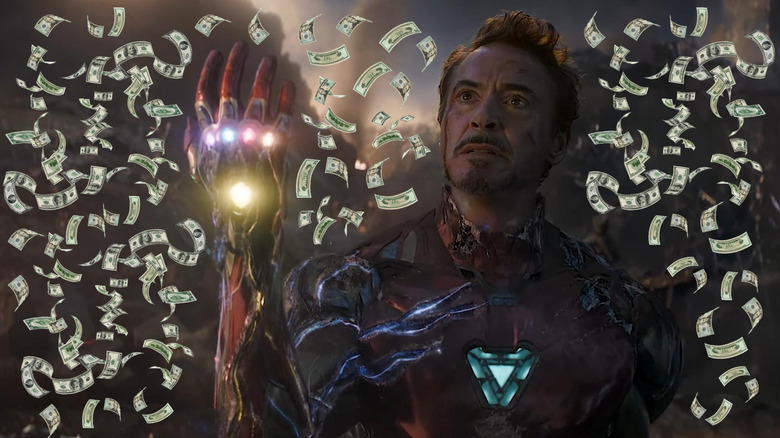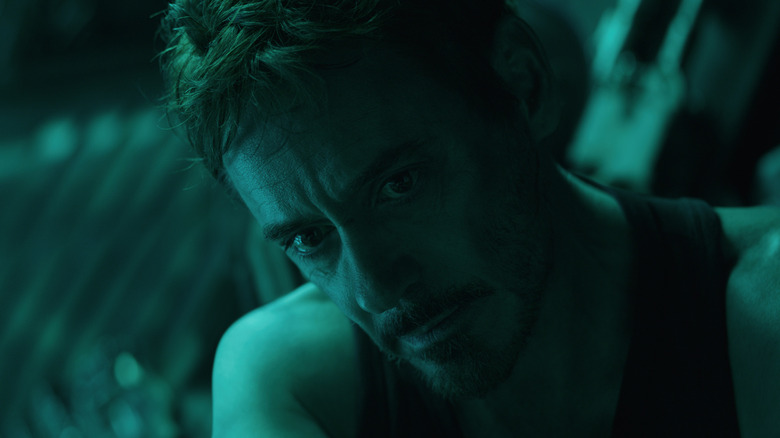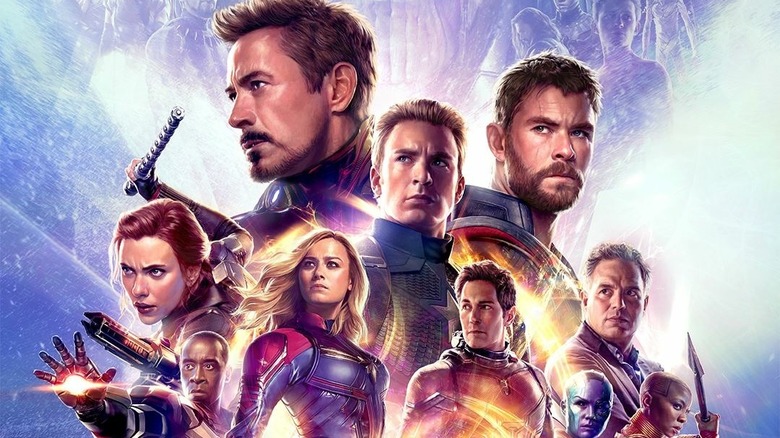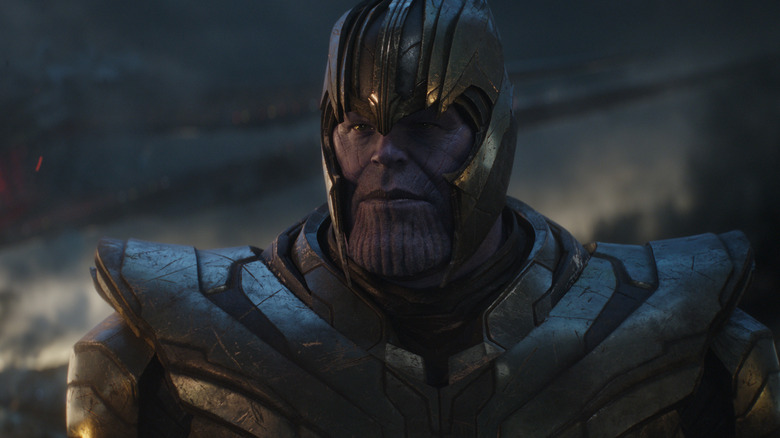5 Years Ago, Avengers: Endgame Took The MCU To A Record-Shattering Box Office Peak
(Welcome to Tales from the Box Office, our column that examines box office miracles, disasters, and everything in between, as well as what we can learn from them.)
"No amount of money ever bought a second of time." Those are the words uttered by Robert Downey Jr.'s Tony Stark in "Avengers: Endgame" during a pivotal scene after he traveled back in time to save the world, only to run into his own father. It's true, money can't buy time. But in 2019, audiences shelled out money in record-breaking amounts to spend lots of time in movie theaters all around the world to see the conclusion to the Marvel Cinematic Universe up to that point. Money, in this case, bought something like 10,800 seconds of shared experience the likes of which hasn't been seen before or since.
By 2019, the MCU had become the single most popular franchise in the history of cinema by weaving together disparate, individual franchises for big crossover events, with 2012's "The Avengers" serving as a proof of concept that redefined blockbuster filmmaking. Marvel Studios head Kevin Feige had a vision, and that vision captured the attention of millions of people around the world. Those people were so wrapped up in these heroes and their battle with the Mad Titan known as Thanos that they were about to make history by turning out in droves to bring the Marvel Cinematic Universe — and moviegoing as a collective activity — to its cultural peak.
In this week's Tales from the Box Office, we're looking back at "Avengers: Endgame" in honor of its fifth anniversary. We'll go over how "Infinity War" set sky-high expectations for the follow-up, what happened when the movie hit theaters, how it briefly held a record that was stolen back by James Cameron in short order, and what lessons we can learn from it several years removed. Let's dig in, shall we?
The movie: Avengers: Endgame
Marvel Studios first announced the conclusion of Phase 3 of the MCU a decade back in 2014 at a now-legendary press event where the company laid out its plans for several years' worth of big films. It was all set to culminate in what was originally billed as "Avengers: Infinity War Part 1" and "Avengers: Infinity War Part 2." Eventually, the titles changed but the broader plans remained the same. Joe Russo and Anthony Russo, who directed both "Captain America: The Winter Soldier" and "Captain America: Civil War," were selected to helm the films, which would meaningfully bring Thanos to the MCU.
Thanos did, indeed, make his presence known in 2018's "Avengers: Infinity War," a movie that played like "The Empire Strikes Back" for Marvel fans. The Mad Titan succeeded in his quest to destroy half of all life in the universe, including a great many heroes whom audiences had come to know and love. The film was an enormous success, with "Infinity War" taking in just over $2 billion at the global box office, becoming one of just a few films to accomplish that feat up to that point.
Interestingly, "Avengers: Endgame" was known only as "Avengers 4" for months after the release of "Infinity War," leaving fans to speculate hopelessly as they pondered the fate of those who were dusted by Thanos. The title wasn't revealed until the first teaser for "Endgame" was released in December 2018. Feige, speaking in February 2019, explained that it was a matter of not spoiling anything for audiences.
"It was a spoiler, because if you knew before 'Infinity War' came out that the next movie was called 'Endgame,' then you know that there wasn't an ending to 'Infinity War.' But that had been the title of the movie from the moment we conceived of doing the two films. In large part, because ... it's seeded right there. I mean, it's seeded in '[Age of] Ultron.'"
The hectic production of Avengers: Endgame
Indeed, the whole "endgame" line was first teased in 2015's "Avengers: Age of Ultron" but, more directly, was set up when Benedict Cumberbatch's Doctor Strange says, "We're in the endgame now" in the third act of "Infinity War." As for the actual filming of "Endgame," the Russo Brothers and Marvel Studios originally planned to shoot it concurrently with "Infinity War."
Somewhat late in the game, they decided to shoot the films back-to-back instead, believing that was the best way to do the massive job before them. That, understandably, resulted in its own brand of chaos. Producer Trinh Tran described the chaos that was the production in the 2021 book "The Story of Marvel Studios: The Making of the Marvel Cinematic Universe."
"The first hour would be 'Infinity War' additional photography. The second hour would be 'Endgame,' with five units shooting across the Pinewood Atlanta Studios; The Russos would be running around with two separate filming units, while as many as three second unit directors would be shooting scenes at the same time. Then, at three o'clock, Tran and the Russos Would run across the street to postproduction and take a quick look at an Infinity War sequence that they had spent the entire previous night looking at."
Screenwriters Christopher Markus and Stephen McFeely had their own challenges. They didn't have a solid plan to get out of what they did at the end of "Infinity War." It wasn't until they entertained the "stupidest' idea they had, which was time travel, that things came together. As Markus explained in the "Endgame" commentary track:
"This [scene] ... sort of mirrors us sitting in a room, trying to figure out how the hell to get out of the corner we wrote ourselves in at the end of 'Infinity War,' and entertaining the idea of a time machine, and then feeling that that was the stupidest idea you could possibly have. But then realizing that the 'Ant-Man' franchise, which we hadn't dealt with yet, had legitimately — if you believe the science — the seeds of a time machine in it, which was a breakthrough."
Avengers: Endgame was sold as an ending of sorts for the MCU
One of the biggest issues Disney, Marvel Studios, and the Russos had to contend with was keeping the movie's secrets under wraps. The Russos, Markus, and MacFeely had the ending of "Endgame" set up before setting out on this journey, so they had that as a guiding light. But to help keep stuff like Tony Stark's death under wraps, they went so far as to shoot multiple fake endings, as Hulk actor Mark Ruffalo revealed in April 2019 just ahead of the release.
"I shot, like, five different endings to this movie. I didn't even get a whole script of this movie. I don't know why. The script I did get had dummy scenes in it. He [pointing to Chris Evans] gets married in this!"
There would be no wedding. There would, however, be many surprises in store for the audience. That only seemed appropriate, as the MCU had been building to this event for nearly a full decade. The enterprise wasn't going to fully come to an end — nobody had any illusions of that being the case. But Feige and the Disney marketing machine leaned into the idea of "Endgame" being, well, the end. As Feige once put it:
"Marvel Studios and the Marvel Cinematic Universe is now past their tenth anniversary and with the release of the final Avengers movie, we've finally completed a 22-movie Infinity Saga."
Disney did everything imaginable to make sure seemingly every moviegoer around the world knew that "Avengers: Endgame" was going to be a cinematic event unlike anything cinema has ever seen. This was the conclusion of a decade's worth of interconnected storytelling on the biggest scale imaginable. From an insane number of character posters boasting the tagline "avenge the fallen" to a flashy Super Bowl spot, there was no escaping the large shadow this movie was casting over the pop culture landscape at the time.
The financial journey
In 2008 when "Iron Man" became an unlikely hit that birthed the MCU, hardly anyone in the general public was familiar with the character. By 2019? Robert Downey Jr. was the biggest actor in the world and Tony Stark was an icon. Comic book culture had become so mainstream thanks to these films that "Avengers: Endgame" had become the collective cultural event of the year. Hence, the movie's three-hour runtime wasn't an issue as the moviegoing masses were all-in on seeing this story play out.
Naturally, all of Hollywood steered clear of "Endgame" when it hit theaters on April 26, 2019, exactly one year after "Infinity War" opened. Naturally, tracking was through the roof and estimates had the film pulling in as much as $800 million worldwide on its opening weekend alone. It turns out, those projections were wildly conservative. The Russo Brothers' giant superhero crossover opened to a record-shattering $357 million domestically. Globally, "Endgame" opened to an insane $1.2 billion. When we consider that only 54 movies have ever made $1 billion or more in their entire theatrical runs, that is difficult to grasp.
Even against a gigantic budget in the $350 million range (plus a gigantic marketing spend), the film was pretty much in profits by the time Monday morning rolled around. Yes, the Marvel Comics epic dropped nearly 59% in its second weekend, but that still amounted to $147 million domestically. Most movies would kill for that kind of money on opening weekend. To say that it was a hit would be an insulting understatement.
The world had never seen such feverish demand for a movie at the outset. It was a cultural phenomenon without comparison. The only thing that even came close was when "Star Wars: The Force Awakens" arrived in 2015. For what it's worth, that movie still holds the global domestic box office record with $936 million.
Avengers: Endgame comes (briefly) for Avatar
As the weeks rolled on, it became increasingly clear that "Avengers: Endgame" had a chance to do the unthinkable; defeat "Avatar." James Cameron's 2009 sci-fi smash amassed nearly $2.79 billion in its original run to become the biggest movie in history. For years, it seemed like that number was straight-up untouchable, particularly when "The Force Awakens" topped out at $2.07 billion. However, Marvel's crowd-pleasing finale to the first three phases of the MCU was reaching global audiences in a way not even a galaxy far, far away could.
Come late July 2019, it finally happened. Disney announced that "Endgame" had, indeed, surpassed "Avatar." Cameron, for his part, took losing the record quite well. In a September 2019 interview, the filmmaker explained that "Endgame" doing what it did gave him a lot of hope in making his "Avatar" sequels.
"It gives me a lot of hope. 'Avengers: Endgame' is demonstrable proof that people will still go to movie theaters. The thing that scared me most about making 'Avatar 2' and 'Avatar 3' was that the market might have shifted so much that it simply was no longer possible to get people that excited about going and sitting in a dark room with a bunch of strangers to watch something..."
All told, "Avengers: Endgame" pulled in $858.3 million domestically to go with $1.941 billion internationally for a grand total of $2.799 billion globally. It was, for a time, the biggest movie in the history of movies. In an odd bit of poetry, Cameron had the last laugh as a re-release of "Avatar" in China in 2021 once again made it the highest-grossing movie ever, with a new running total of $2.92 billion.
Even so, what "Endgame" managed to do was nothing shy of a once-in-a-lifetime miracle. Particularly in the aftermath of the pandemic, it's almost hard to think back to a time when so many people rallied around the experience of seeing a movie together in theaters. It was Marvel's finest hour and remains the MCU's crowning achievement.
The lessons contained within
Looking back, it's dizzying to consider what the average movie can learn from "Avengers: Endgame." The fact that it came together at all is nothing shy of a miracle. The fact that it's widely considered to be a great movie on top of the fact that it merely exists? Incredible. It's a specific confluence of events that may never, ever happen again. For those who lived through it, we're probably looking at one of those "you had to be there" moments we'll all be telling the younger generation someday.
Looking at the state of the MCU five years later, there is one key lesson here worth examining. Part of what made "Endgame" so effective is that it felt like a true event that had been earned by years of cinematic storytelling. It also felt like the closest thing to a conclusion we were ever going to get. Were it not for the pandemic delaying "Black Widow" and the rest of Phase 4, the MCU would have just rolled right along. Even with the pandemic delay, the MCU has struggled, by and large, to achieve such heights again.
Yes, we had "Spider-Man: No Way Home" in 2021 pulling in $1.9 billion worldwide. That's in no small part because that film, in its own right, was teed up as the conclusion of nearly 20 years worth of Spidey on the big screen. Other than that, we've had more misfires such as "Eternals" or last year's disastrous "The Marvels." The MCU has struggled to find an identity in the post-Infinity Saga years.
I'm keenly aware that the money machine that is Disney would never allow it, but there's something to be said for taking a break. If Marvel ever wants to find its way back to the palpable excitement audiences once had for these characters and this universe, they need to have a second to breathe. Audiences need to have the chance to want it again.






